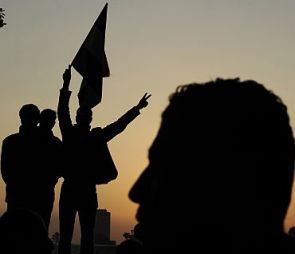 | « Back to article | Print this article |
 If viewed as a part of the Al Qaeda's radicalisation effort to produce jihadists out of discontented Muslim youth in India, the call could well have a much larger dimension, both in the near as well as long term, directly impacting on national security, says Bibhu Prasad Routray.
If viewed as a part of the Al Qaeda's radicalisation effort to produce jihadists out of discontented Muslim youth in India, the call could well have a much larger dimension, both in the near as well as long term, directly impacting on national security, says Bibhu Prasad Routray.
The title could well be inspired by an evangelical video, "There's A Storm On the Ocean". On July 23, Al Qaeda's media arm, As-Sahab, released the English translation of a video statement it had posted earlier in June calling upon Indian Muslims to join the jihad in Syria. Titled, "A Message for the Muslims of India: Why is There No Storm in Your Ocean?", this video features Maulana Aasim Umar, an Al Qaeda ideologue believed to be based in northwest Pakistan.
Umar is believed to be 'a scholarly militant who liaises closely with Al Qaeda’s core leadership'. Many of Umar's writings are freely available on the internet and include "Teesri Jange Azeem aur Dajjal", "Imam Mehdi (R.A) K Dost Aur Dushman", etc.
Speaking in Urdu, Umar vents his frustration regarding the inability of the organisation to recruit Indian Muslims into global jihad.
The 11-page statement specifically exhorts the Muslims of Delhi, Uttar Pradesh, Bihar, southern India and Gujarat to "Join the forces of global jihad." Some of the points he makes:
According to the Long War Journal, Umar claimed in July that many militant leaders and fighters from the Af-Pak region have been transferred to the Syrian front. "At present, Al Qaeda and other mujahideen of Islam have fully controlled this movement", he said in a statement. "Several lashkars from Afghanistan are also leading in Syria", he added.
The BBC in July, quoting Mohammad Amin, a senior Taliban operative and 'co-ordinator of the Syrian base, too reported that 12 Tehrik-e-Taliban "experts in warfare and information technology" have been moved to Syria in the past two months (May and June 2013) to aid Syrian jihadists.
The TTP's Syrian base came up sometime in January/February 2013. Although further details are currently unavailable, the base remains integral part of the Pakistani Brigade 313, which consists of the Taliban and associated jihadist groups such as the Laskhar-e-Jhangvi, Harkat-ul-Jihad-al-Islami, Lashkar-e-Tayiba, Jaish-e-Mohammed, Jundallah (the Karachi-based, Al Qaeda-linked group), and several other Pakistani terror groups are known to have merged with Al Qaeda in Pakistan.
To dismiss Umar's call to the Indian Muslims as a rhetorical statement with an outward and external manifestation could be a mistake. The natural tendency would be to treat the statement with negligible repercussions on the India's security. The timing of the English translation could well be linked to the American Vice President Joe Biden's trip to India.
However, viewed as a part of the Al Qaeda's radicalisation effort to produce jihadists out of discontented Muslim youth in India, the call could well have a much larger dimension, both in the near as well as long term, directly impacting on national security.
Image used for representation only
Dr Bibhu Prasad Routray is a Singapore-based security analyst/consultant and served in the National Security Council Secretariat, New Delhi.